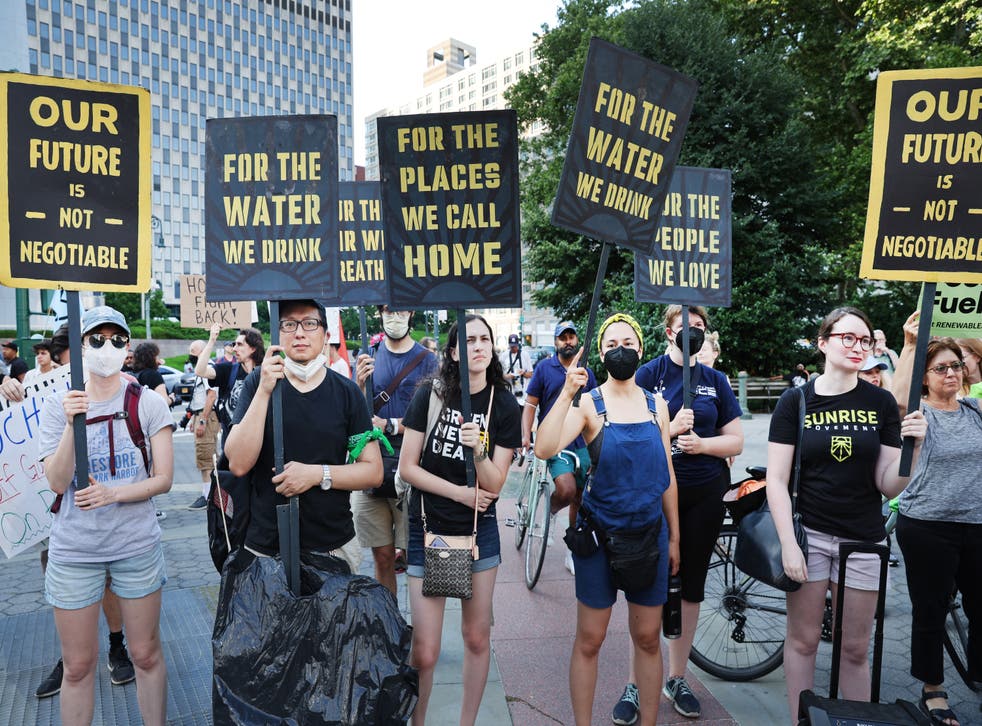Thankfully lots of people in America are not waiting for Joe Biden or Donald Trump to tackle biggest problems, says Andrew Buncombe
It is often easy to feel depressed about the United States.
The nation, along with what some people’s idea of what it should stand for, has had it pretty bad for some time now.
Even as people emerge from the pandemic that turned lives on their heads, inflation stands at more than eight per cent and the cost of essentials pushes more and more into hardship.
Meanwhile, the same regressive justices – in truth, political actors as much as any elected representative – made it easier to carry hand guns, and easier for energy companies to pollute the planet.
The same is true of gun control activists. After so many senseless mass shootings, a number of them at schools, groups such a Mach for Our Lives have refused to give into pessimism or accept that nothing can change.
Last month, these activists – including David Hogg, Emma González, Audrey Wright and D’Angelo McDade – were rewarded with the fist major gun legislation in 30 years, a bill that nobody thinks is perfect, but nonetheless will likely save some lives.
On the environment, while Trump pulled America out of the Paris Accord, activists from groups such as the Sunrise Movement started pushing for action at a local and state level, seeking to leverage companies and cities and anyone who could listen, that the climate crisis was too existential a threat to ignore.
For the first time in 30 years we passed a new gun law at the federal level.
Told you this time was different 🙂 https://t.co/x37BG44EVU— David Hogg ☮️ (@davidhogg111) June 25, 2022
Wanjiku “Wawa” Gatheru, an activist from Connecticut, established a network of similarly minded people, and demanded environmental solutions at a local level. (She is currently a Rhodes Scholar at Oxford University, studying for a MSc.)
One thing many of these organisers had in common was that they were young people, unwilling to be pushed away with “businesses as usual” excuses, and acutely aware of the power in their hands, when they acted in concert.
When a fossil fuel company wanted to extend the Keystone Pipeline through North Dakota, it was young people from diverse backgrounds who camped out and protested and were led away in handcuffs.
When George Floyd was choked to death in Minneaopolis by the police, it was young people whose protests were picked up around the world. (It was young people, too, who threw themselves into the jobs of distributing food and medicine, when some of the city’s shops were set on fire.)
In the aftermath of the killing of 25-year-old Jayland Walker in Akron, Ohio, it has been young people again demanding action, as it was after the killings of Eric Garner, Michael Brown, Sandra Bland, Breonna Taylor and so many others.
READ ALSO: Stoning Of Devil in Hajj and its American connection
When the committee investigating the January 6 attack on the US Capitol and the alleged role of Trump in firing up the crowd and his supporters to “fight like hell” as they sought to prevent Biden’s certification, it was a young woman, Cassidy Hutchinson, who agreed to testify under oath, when so many of her much senior colleagues refused to, or pleaded the Fifth Amendment.
It's people like @wawagatheru that give me hope for our future. We are so happy to have you at IMPACT on the @green4ema Board. #EMAIMPACT pic.twitter.com/1Hn261K093
— Debbie Levin (@DebbieatEMA) June 2, 2022
People of all political beliefs can surely applaud her courage.
“I was really saddened as an American. I was disgusted. It was unpatriotic. It was un-American. We were watching the Capitol get defaced over a lie,” she told the committee of the events of January 6.
None of this is a call for blind patriotism or teary-eyed flag-waving.
America, like most countries, is a nation with plenty of problems.
Nearly 250 years after America secured its independence from Britain, too many here refuse to even acknowledge the slave-owning, colonial heritage of the Founding Fathers, and the racist system they set in motion. A half-century after the Civil Rights Act, Black families have on average one-tenth of the wealth of white families. The pandemic also highlighted the stark inequality, one that is actually growing, rather than closing.














